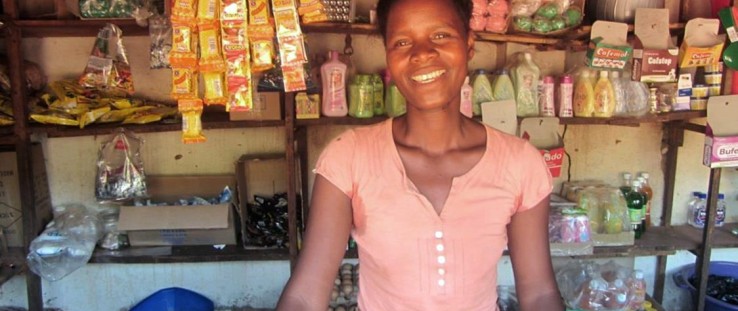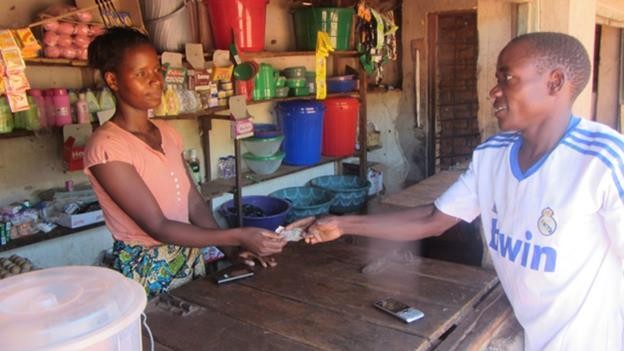 Rita Mbewe can afford a smile because of a healthy family and good income.
Isaac Masingati/INVC
Rita Mbewe can afford a smile because of a healthy family and good income.
Isaac Masingati/INVC
 Rita Mbewe can afford a smile because of a healthy family and good income.
Isaac Masingati/INVC
Rita Mbewe can afford a smile because of a healthy family and good income.
Isaac Masingati/INVC
Speeches Shim
Intense heat, sun-scorched fields and the brown tones of water-starved crops dominate the landscape of Mlonyeni, a tiny farming village located in central Malawi. The September sun is relentless with no rain in sight, but this does not deter Rita Mbewe, a secondary school dropout and mother of three, from traveling nearly 8 kilometers each day to fetch water for cooking, washing and cleaning.
In the past, Mbewe’s family reeled under the burden of poverty, solely dependent on a piece of land that produced too little each season to feed her family. Like many Malawians, her days were filled with the arduous chores of survival, while her nights were punctuated with anxiety about her family’s future. How would she afford seeds? Where could she find the money to purchase fertilizer? How could she increase her crop yields to feed her family for a full year?
Three years ago, Mbewe’s situation dramatically improved. She learned how women in neighboring villages were escaping poverty by joining village finance platforms (VFPs). Funded by USAID through Feed the Future, the U.S. Government’s global hunger and food security initiative, they are designed to help communities save, loan and invest money within a village to reduce rural poverty and improve nutrition. VFPs help women purchase certified maize seeds and fertilizer for more productive crops, iron sheets for more secure roofing, and bicycles to establish a neighborhood taxi service.
Mbewe was determined to pioneer a VFP for her village. Selling the idea to several of her friends, the journey to financial transformation had begun.
Soon, news of women planning to establish a VFP swept through the village. Within a week, 15 women expressed interest. Excitement was high and, a few days later, the figure rose to 20 and continued to grow. The challenge was how to set up a well-organized group with established guidelines.
The women invited a representative of Feed the Future Malawi to show them the way. Soon, they had a brief constitution that would guide them. A committee was put in place to ensure orderliness. Dzaone VFP was born in Kondowole village and soon the members could buy shares and get soft loans at an interest rate agreed to by all.
Mbewe invested the only money she and her husband had, and watched it grow enough within three months to buy fertilizer and school uniforms for her children. She could afford a diversified diet in her home and the nutrition of the family began to change.
With help from the savings group, Mbewe now grows more maize than her family needs—the surplus is sold and the profits saved for the next crop cycle. In addition to maize, Mbewe grows groundnut and soybean, two value chain crops Feed the Future is promoting in the country’s seven districts. Some money from the sale of groundnuts and soy is ploughed back into the VFP, where it earns interest.
Every nine months, group members gather to share the profits; each according to the value of her shares. The last time they shared, Mbewe received MK250,000 (Malawian kwachas, or $347), and each group member went home smiling. The VFP is now in its third cycle and many women have started small-scale businesses with their proceeds.
“My friends at the VFP keep saying ‘Sell some. Keep some. Invest some.’ This simple approach has worked well for me and my family,” says Mbewe.
The Feed the Future Malawi Integrating Nutrition in Value Chains (INVC) project aims to improve household nutrition while lifting poor communities out of the poverty trap. It encourages the use of modern farming technologies to boost agriculture productivity so farmers harvest enough to last, with surplus to sell. In Mchinji district where Mbewe lives, the project is using the VFPs to pass on agriculture extension messages and nutrition tips. After discussing money, they discuss agriculture and nutrition, including what crops to grow and how to grow them.
“This Is My Shop”
Energized by her success and encouraged by her VFP friends, Mbewe started planning for the future.
“We are told not to let our money from agriculture lay idle but invest it in some business. We must use the profits to provide our families with food and other basic needs. My family is healthy ever since I started following nutrition tips we learn from the VFP,” she explains.
With an idea for starting a small business, Mbewe went back to the VFP to borrow MK4,000 ($5) at a 20 percent interest rate. She used the loan to buy several kilograms of dried fish, which she sold door-to-door in the neighborhood. Within weeks, Mbewe paid back the loan to the VFP—months ahead of schedule. Surplus fish were used to provide her family with a consistent source of protein. Business profits were saved for future agricultural purchases.
With profits growing and savings at the VFP rising, Mbewe started to think big. With support from her husband, she set up a mini-shop by the main road that connects central Malawi to the Zambian border. She sells sugar, soap, salt, processed food and many other groceries.
Standing outside her modest business in the January rain, Mbewe proclaims, “This is my shop. My husband and I own it.” The shop, small as it looks, is her dream come true.
Isaac Masingati is a communications specialist with the Integrating Nutrition in Value Chains project.




Comment
Make a general inquiry or suggest an improvement.